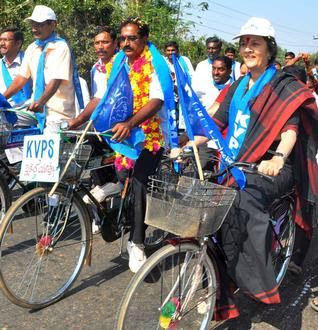CITU denounces the utter insensitivity of the Union Budget 2011-12 to the most pressing and burning issues before the common people, the toiling class in particular, viz. price rise and public distribution system and rising unemployment. The issue of universal social security of the vast unorganized sector workers also stands totally ignored.
The budget has not addressed a single step in addressing the issue of relentless price rise especially of food items which is bringing tremendous miseries and hardship to the mass of the working populace. Rather, the Govt overtures reflected both in the Economic Survey (2010-11), and the Budget Speech clearly signal its policy of patronizing the Corporate Traders and Speculators in the commodity market on the plea of modernizing the supply chain. The Finance Minister is eloquent in while admitting that more than 40 millions tons food grains are stored with the Govt at present (which is much above the buffer stock norm) but does not bother to propose any step to distribute the surplus grains, at reduced prices through strengthened Public Distribution system in order to generate downward push in the food prices.
That the high price phenomenon in basic food commodities is being nourished and promoted by the Govt. to facilitate the windfall gains by the corporate traders through speculation and hoarding has become crystal clear from all such actions as well as its loud projection of present inflation as growth-induced and its pleadings for liberalized FDI-entry in multi-brand retail trade. It continued to remain negligent towards addressing the crisis situation in agriculture supplying food and other basic necessities to people. Despite devoting long speeches on the urgent need for improving the agriculture, the budgetary provisions remained much below the requirement and actually marked a decline both as proportion to overall budgetary expenditure and as percentage of GDP.
CITU resents the way the budget has totally ignored the demand for a National Social Security Fund for unorganized sector with allocation of substantial fund put forth unanimously by All the Central Trade Unions in the country and also recommended by the National Social Security Board headed by the Union Labour Minister. In the background of continuous and consistent countrywide struggle by the Anganwadi workers and helpers the rise in their remuneration announced in the budget is a delayed but welcome development. However, it must be noted simultaneously that still remuneration of these Anganwadi workers and helpers will remain much below even the statutory minimum wage despite their frontline role in country’s flagship child development scheme.
Govt’s bias against common people stands exposed by its budgetary decision to reduce the direct tax to the tune of Rs 11500 crore while simultaneously increasing the burden of indirect tax by Rs11300 crore. The budget reduces surcharge on corporate taxes, but does not bother to reduce the custom duty and excise duty on crude oil and petroleum products, despite the fact that crude oil price has reached alarming levels in the international market and govt. is poised to increase price of petroleum product in regular frequency, creating cascading impact on inflation and price rise. CITU demand that govt. should announce immediately abolition of customs duty on crude oil import and reduction of excise duty in petroleum products.
CITU also deplores the single track focus of the budget on reduction of subsidies on basic essentials like food, kerosene, diesel, LPG, fertilizers etc through direct and indirect means while the budget fails to mention any single actionable step for recovering black money as well as huge tax arrears, both within and outside the country, contain tax evasion and other forms of tax leakages.
In the face of explosion of numerous events of corruption involving the entire governance, the budget sought to skip over the entire issue cavalierly except giving lip service about probity in public life.
The budget while being eloquent on GDP growth, is completely silent on the employment generation commensurate to GDP growth. It only encourages and incentivises the Indian Corporates for investing and creating assets and employment abroad, while millions of unemployed youth in the county are yearning for decent job within country.
CITU records its strong opposition to the move for complete deregulation of financial sector through encouraging private banks, liberalizing speculative FII participation in mutual fund schemes, deregulation and liberalized foreign participation in insurance sector and privatization of insurance and pension sector through various legislative and executive measures as proposed in the Budget. All these moves are going to create disastrous consequences for the national economy, if not resisted resolutely through united countrywide action. CITU also reiterates its strong opposition to disinvestment of PSU shares, unleashed by the UPA-II govt with greater vigour, and pledges to resist such disastrous move as reflected in the Budget.
In totality, the Union Budget (2011-12) reflects continuity of the same neoliberal corporate captive anti-people policy regime spreading miseries for the millions to benefit handful of corporate and moneyed class, both domestic and foreign. CITU calls upon the working people to heighten its united resistance to such anti-people policy regime.












